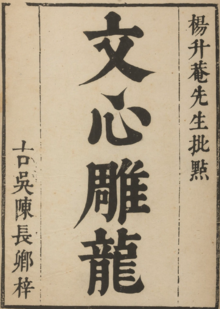
KNOWPIA
WELCOME TO KNOWPIA
Summary
The Literary Mind and the Carving of Dragons (Chinese: 文心雕龍; pinyin: Wén Xīn Diāo Lóng) is a 5th-century work on Chinese literary aesthetics by Liu Xie, composed in fifty chapters (篇) according to the principles of numerology and divination found in the Book of Changes or I Ching. The work also draws on and argues against the 3rd century author Lu Ji's work the Wen fu 文賦 ("On Literature"). Liu Xie wished to give a complete and internally consistent account of literature. One of his ideas is that affections are the medium of literature, and language merely the product.

Translations edit
- Liu Xie (1983). The Literary Mind and the Carving of Dragons. Translated by Vincent Yu-chung Shih. Hong Kong: The Chinese University Press – via archive.org.
- Liu Xie (2003). Dragon-Carving and the Literary Mind. Translated by Yang Guobin. Beijing: Foreign Language Teaching and Research Press.
References edit
- A Chinese literary mind: culture, creativity and rhetoric in Wenxin Diaolong, 2001 (Zong-qi Cai, ed.).
- Owen, Stephen. Readings in Chinese literary thought. No. 30. Harvard Univ Asia Center, 1992.
- Richter, Antje. "Notions of Epistolarity in Liu Xie's Wenxin dialong." Journal of the American Oriental Society 127.2 (2007), pp. 143-160.
- Zhao, Heping. "Wen Xin Diao Long": An early Chinese rhetoric of written discourse. Purdue University. ProQuest Dissertations Publishing, 1990. 9301248.
External links edit
Chinese Wikisource has original text related to this article:
Wen Xin Diao Long (in Chinese)
- Wen Xin Diao Long – Full text (traditional/UTF-8) from Project Gutenberg
- 《文心雕龍》. – Chinese text in GB/Simplified characters from the website "Sinology" (國學).
- The Literary Mind and the Carving of Dragons 《文心雕龍》 Chinese text with (partial) matching English vocabulary (Chinese Notes Digital Library)


